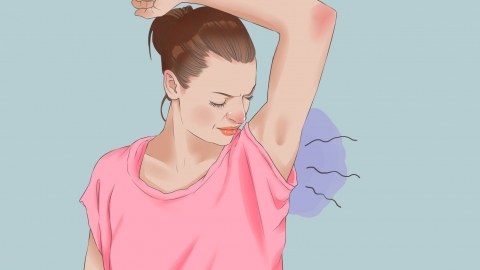How to completely eliminate body odor (bromhidrosis)
Bromhidrosis usually refers to axillary osmidrosis. Generally, axillary osmidrosis may be caused by genetic factors, excessive sweat secretion, local bacterial infection, endocrine disorders, abnormal apocrine gland function, and other reasons. It is recommended to seek timely medical advice, identify the cause, and improve the condition under a doctor's guidance through general treatments, medication, surgical treatments, and other methods. A detailed analysis is as follows:

1. Genetic factors: Heredity may lead to a unique structure of the apocrine glands under the armpits, causing sweat to contain more substances that are easily decomposed, resulting in odor. In daily life, it is important to bathe frequently, focusing on cleaning the underarms, wear sweat-absorbing and breathable cotton clothing to reduce sweat residue, and use antiperspirant sprays to temporarily inhibit sweat secretion.
2. Excessive sweating: In high-temperature environments, during intense physical activity, or when emotionally stressed, sweat glands under the armpits secrete more sweat, which is then decomposed by bacteria, causing odor. One should avoid staying in high-temperature environments for prolonged periods, bathe and change clothes promptly after exercising, keep the underarms dry, and reduce stress-induced sweating by maintaining regular sleep patterns and relaxing.
3. Local bacterial infection: A moist environment under the arms easily breeds bacteria such as staphylococcus, which decompose organic substances in sweat, producing a foul odor. Patients should follow medical advice to apply medications such as aluminum chloride solution, formaldehyde solution, or hexamethylenetetramine solution to the underarms to inhibit bacterial growth and sweat secretion.
4. Endocrine disorders: Hormonal changes caused by puberty or conditions such as hyperthyroidism can stimulate increased sweat gland secretion, triggering or worsening axillary osmidrosis. The underlying disease should be treated first—for example, patients with hyperthyroidism should follow medical advice to take medications such as methimazole tablets, propylthiouracil tablets, or carbimazole tablets to regulate thyroid function, along with underarm hygiene to reduce odor.
5. Abnormal apocrine gland function: Sweat secreted by the apocrine glands has an abnormal composition containing large amounts of fatty acids and proteins, which are more easily decomposed by bacteria, causing odor. When symptoms are severe, minor incision excision may be chosen, where a small incision is made to remove or destroy part of the apocrine glands under the armpit, reducing abnormal sweat secretion.
In daily life, one should avoid consuming excessive spicy and irritating foods to reduce the concentration of sweat odor. Choose loose and breathable clothing to prevent the underarm area from becoming hot and humid, and alleviate symptoms through comprehensive care, maintaining healthy underarm skin and overall body comfort.





